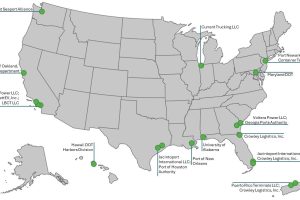Understanding the dangers of EV fires
NewsBattery-powered mobile handling plant is gradually gaining ground in ports, but there is a knowledge gap when it comes to the risk of fires.
The U.S. awards US$148 million in grants for port air quality improvements, focusing on electrification and reduction of truck emissions.
The U.S. Department of Transportation’s Federal Highway Administration (FHWA) has awarded US$148 million in grants to 11 states and Puerto Rico under the first round of a new US$ 400 million program to improve air quality and reduce pollution at U.S. ports.
The Reduction of Truck Emissions at Port Facilities Grant Program, which was created by the Bipartisan Infrastructure Law (BIL), invests in port electrification and efficiency improvements.
In this first round of grant awards, FHWA has funded 16 projects, including replacing diesel-powered trucks serving ports with zero or low emissions electric or alternative fuel-powered trucks, constructing electric vehicle charging infrastructure, employing port roadway access improvements, and studying technology enhancements to reduce truck emissions.
California is receiving US$ 49.7 million for port improvements. The Ports of Long Beach, Oakland and Los Angeles will receive funding to replace diesel- and gas-powered trucks and shuttle buses with zero-emission technologies, electric trucks and EV chargers.
Read more: Port of Long Beach and Port NOLA secure federal grants
Texas is receiving US$ 26.9 million for improvements to the Port of Houston, including 30 new zero-emission, short-haul trucks and portable electric chargers for battery electric vehicle trucks. It will also pay for the installation of new automated terminal operating systems to reduce truck idling times.
Read more: Port Houston secures US$ 26.9M grant for clean truck programme
Georgia is receiving US$ 15.3 million for improvements at the Port of Savannah.
Florida has won US$ 10 million for Talleyrand Marine Terminal in Jacksonville and the Port Everglades Terminal in Fort Lauderdale to replace diesel-powered trucks, while terminal improvements at the Seaboard Port of Miami will reduce truck idling time at the gates.
Louisiana‘s Port of New Orleans and its partners will receive US$ 7 million to buy 14 heavy-duty, all-electric terminal trucks, and five, light-duty, all-electric pick-up trucks to replace diesel vehicles currently in use. Funding also will be used to upgrade electrical infrastructure, track emissions and energy use, and evaluate new emissions-reducing equipment. Partners include BP Pulse, Entergy New Orleans, New Orleans Terminal, Ports America Louisiana, Urban League of Louisiana, and Nunez Community College.

In New Jersey, the Port Newark Container Terminal will receive US$2.2 million to replace 20 diesel trucks with more efficient vehicles that run on clean, low-emitting propane fuel. A study performed at the port showed that propane trucks will cut harmful nitric oxide emissions, particulate matter, hydrocarbons and greenhouse gases compared with diesel trucks currently used at the port facility.
Puerto Rico is getting US$ 6.6 million for port electrification and electrification of tractors.
The University of Alabama will receive US$4 million to implement a new fuel injection technology on trucks at the Port of Mobile that will reduce fuel consumption and cut emissions of greenhouse gases and other pollutants from idling trucks. Studies and continued testing of the new technology will be conducted at the port facility and has the potential for use nationwide.
The Hawaii Department of Transportation will receive US$5.2 million to modernize port gates and automate improvements at the Sand Island Terminal in Honolulu Harbor.
In Indiana, Current Trucking will receive US$4.4 million to replace diesel vehicles at the Port of Indiana-Burns Harbor with electric vehicles (EVs) to reduce heavy truck idling that contributes to air and noise pollution in the local community. By funding EV trucks and forklifts along with the accompanying charging infrastructure, the port will be able to transition to cleaner, more efficient maritime operations.
The Maryland Department of Transportation will receive US$642,000 to replace one diesel-powered street sweeper with one zero-emission unit to be used at the Port of Baltimore for moving cars and light trucks. Funding also will be used to research and develop the adoption of electric Power Take Off (ePTO) devices on carrier trucks, which average two hours of engine idling per trip while loading or unloading.
Washington‘s Northwest Seaport Alliance has secured US$16 million to provide financial incentives to independent owner-operators and small trucking companies to buy zero-emission, short-haul trucks. The funding could put between 36 to 58 zero-emission, heavy-duty trucks into operation along with the charging/fueling infrastructure needed to support those vehicles in the Seattle-Tacoma region.
By subscribing you will have: